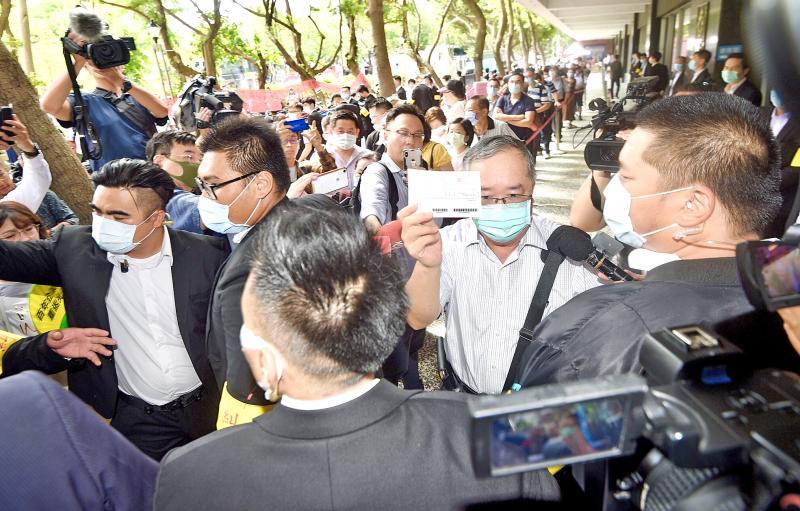The election of board directors yesterday at Tatung Co (大同) sparked controversy after the company blocked some institutional and individual shareholders from participating in the general shareholders’ meeting, prompting the Financial Supervisory Commission (FSC) to announce that the vote would be investigated.
Lin Kuo Wen-yen (林郭文艷) was re-elected as chairwoman of the household-appliance maker’s nine-member board, but prior to the vote she announced that several shareholders would not have voting rights.
They were being denied a vote because they had contravened the Business Mergers and Acquisitions Act (企業併購法), and the Act Governing Relations Between the People of the Taiwan Area and the Mainland Area (兩岸人民關係條例), Lin Kuo said.

Photo: Peter Lo, Taipei Times
The company had previously alleged that some investors have received financial backing from Chinese investors.
Tatung management won six director seats and three independent director seats, leaving minority shareholders led by Shanyuan Group (三圓建設) chairman Wang Kuang-hsiang (王光祥) empty-handed.
Tatung’s move took many people by surprise. It was the first time a publicly listed company in Taiwan has blocked shareholders’ voting rights.
Securities and Futures Bureau Deputy Director-General Tsai Li-ling (蔡麗玲) told a news conference in New Taipei City later in the day that the commission would have Taiwan Depository and Clearing Corp (TDCC, 台灣集中保管結算所) investigate whether Tatung had violated shareholders’ rights.
“Only the government has the right to decide whether shareholders have contravened any regulations, not listed companies. Tatung cannot use this as an excuse to take away shareholders’ voting rights,” Tsai said.
If TDCC concludes that Tatung did contravene the Regulations Governing the Administration of Shareholder Services of Public Companies (公開發行股票公司股務處理準則), it would be barred from holding board elections on its own, among other shareholder services, and would have to have such elections run by a third-party, Tsai said.
The Taiwan Stock Exchange has also asked Tatung to explain its decision, Tsai said.
If its explanation is found wanting, the exchange could fine the firm up to NT$5 million (US$168,577) or delist it, she said.
Tatung’s attorney Lai Chung-chiang (賴中強) told an evening news conference that the firm barred 27 shareholders from exercising their voting rights, including eight foreign investors and three firms belonging to Shanyuan Group and an investor surnamed Cheng (鄭), although they together owned a 53 percent stake in the company.
“We took away their rights, as some investors own more than a 10 percent stake, contravening the Business Mergers and Acquisitions Act, and as they aimed to acquire Tatung, but did not provide true information to the government,” Lai said.
The company revoked Cheng’s voting rights after prosecutors questioned whether he helped Chinese investors buy Tatung shares, which would contravene the Act Governing Relations Between the People of the Taiwan Area and the Mainland Area, Lai said.
Many of Tatung’s units, including solar-power generation, construction and publications, are not allowed to accept investment from Chinese investors, so it was important that the firm blocked questionable investors, he said.
“Disputes regarding voting rights should be part of a firm’s self-governance. If an investor cannot accept our move, they can file a lawsuit,” Lai said.

Hon Hai Precision Industry Co (鴻海精密) yesterday said that its research institute has launched its first advanced artificial intelligence (AI) large language model (LLM) using traditional Chinese, with technology assistance from Nvidia Corp. Hon Hai, also known as Foxconn Technology Group (富士康科技集團), said the LLM, FoxBrain, is expected to improve its data analysis capabilities for smart manufacturing, and electric vehicle and smart city development. An LLM is a type of AI trained on vast amounts of text data and uses deep learning techniques, particularly neural networks, to process and generate language. They are essential for building and improving AI-powered servers. Nvidia provided assistance

DOMESTIC SUPPLY: The probe comes as Donald Trump has called for the repeal of the US$52.7 billion CHIPS and Science Act, which the US Congress passed in 2022 The Office of the US Trade Representative is to hold a hearing tomorrow into older Chinese-made “legacy” semiconductors that could heap more US tariffs on chips from China that power everyday goods from cars to washing machines to telecoms equipment. The probe, which began during former US president Joe Biden’s tenure in December last year, aims to protect US and other semiconductor producers from China’s massive state-driven buildup of domestic chip supply. A 50 percent US tariff on Chinese semiconductors began on Jan. 1. Legacy chips use older manufacturing processes introduced more than a decade ago and are often far simpler than

STILL HOPEFUL: Delayed payment of NT$5.35 billion from an Indian server client sent its earnings plunging last year, but the firm expects a gradual pickup ahead Asustek Computer Inc (華碩), the world’s No. 5 PC vendor, yesterday reported an 87 percent slump in net profit for last year, dragged by a massive overdue payment from an Indian cloud service provider. The Indian customer has delayed payment totaling NT$5.35 billion (US$162.7 million), Asustek chief financial officer Nick Wu (吳長榮) told an online earnings conference. Asustek shipped servers to India between April and June last year. The customer told Asustek that it is launching multiple fundraising projects and expected to repay the debt in the short term, Wu said. The Indian customer accounted for less than 10 percent to Asustek’s

Gasoline and diesel prices this week are to decrease NT$0.5 and NT$1 per liter respectively as international crude prices continued to fall last week, CPC Corp, Taiwan (CPC, 台灣中油) and Formosa Petrochemical Corp (台塑石化) said yesterday. Effective today, gasoline prices at CPC and Formosa stations are to decrease to NT$29.2, NT$30.7 and NT$32.7 per liter for 92, 95 and 98-octane unleaded gasoline respectively, while premium diesel is to cost NT$27.9 per liter at CPC stations and NT$27.7 at Formosa pumps, the companies said in separate statements. Global crude oil prices dropped last week after the eight OPEC+ members said they would